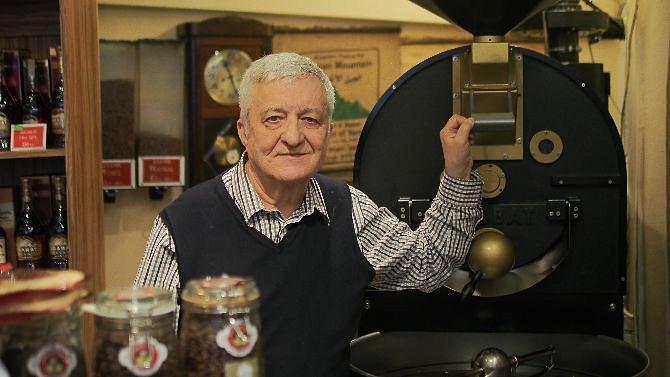In Bucharest's temple of coffee, with Gheorghe Florescu, the number one enemy of mixing coffee with milk



A coffee legend living in downtown Bucharest shares stories and coffee secrets.
It’s Saturday morning,the long-time-no-see sun is up again, so it’s time for a caffeine boost, at Florescu’s, downtown Bucharest. The small shop in Piata Rosetti is the temple of coffee, the real deal, and the owner, Gheorghe Florescu, 70, born during the ‘44 bombing, is a walking treasure trove for coffee stories. In the crowded store wallpapered with pictures of him and important people he met along the years, Florescu greets his customers, or rather say charms them, makes them laugh, persuades them, and many times, inserts little fragments of stories.
“The Arabs are saying that their coffee is the best. You know, that coffee with basil, saffron or other spices. But I am against any additive, milk included. I am the number one enemy of adding milk to coffee.” His voice gets more powerful. “Why do they add milk? To hide that the coffee is bad. When the coffee is of good quality and natural, why spoil it with combinations?” Florescu fires the unbeatable truth.
“Cardamom is not that bad,” dares to comment a tall guy with long hair and dark clothes, who is waiting in line to buy coffee. He is probably in his late 20s, but has a soft baby skin. “No, no, no! Don’t say the word! You’ve challenged me now,” Florescu’s green eyes burn with dissidence. “Why do you need cardamom? Cardamom is cardamom, use it wherever you want, but not in coffee!” The young rocker agrees, but adds that coffee with spices may be a good option if you go to a Turkish restaurant. “Restaurants??? There are no restaurants in the world where you can drink good coffee! Don’t go to restaurants unless I open one on the Bosphorus shore, you can come there and drink Armenian coffee. Suleiman the Magnificent used to drink only Armenian coffee. His coffee maker was Armenian. 1530,” Florescu adds laughing, but his words are engulfed by the coffee grinder’s noise.
Florescu was born in 1944, during the war and grew up in a Bucharest neighbourhood where the Armenian, Greek and Jewish communities were still present. He became friends with a Armenian salesman, and at 8 he tasted the first coffee bean with a little bit of sugar on top. “I didn’t start by drinking coffee, rather by eating it.” Some years later he met Avedis Carabelaian, an Armenian coffee master who became his real mentor. “He was always dressed elegantly, with suit and tie and English shoes, and he was, of course, a great smoker.”
Florescu started working really young, but he doesn’t consider himself over ambitious. “The French-Armenian singer Charles Aznavour has some lyrics, ‘In life there are no big gates or small gates, there are only the gates of hazard’. “The hazard decided to meet Avedis Carabelaian who invited me to his shop in Calea Victoriei 33-35, near the Bucharest Telephone Palace, and here I entered the world of coffee and I’ve never left it.” In March 1971, Florescu took over Carabelaian’s coffee store until February 9, 1979, when the Communists decided to ban the right to roast green coffee. But in the end they decided to keep Florescu and an Armenian to roast coffee for the elites of those times: secret police, military, party members. He continued until 1985 when he was removed from the system.
“Welcome into the temple of coffee,” Florescu greets a new customer. “A young lady from Transylvania is recording the dialogue I’m having with the public.” Then he grabs some wafers and shows them to another client, “these are from Vienna, absolutely delicious.” “Please, smile, the future is yours. We brought special Geisha coffee from Costa Rica.”
A coffee lover that respects himself gets up half an hour earlier before his wife and puts the coffee pot on the stove, Florescu explains. “The smartest men in the world are those who bring coffee to their wives in bed. The moment when the spouses drink the coffee somewhere in the house is the most beautiful moment of the day. This ritual is respected by the Governor of the National Bank of Romania Mugur Isarescu. He makes coffee for his wife in a copper pot every morning. The two are drinking Isarescu coffee launched by me when Mr. Isarescu turned 65. It’s a combination of 5 grams of Geisha Panama and 5 grams of St. Helena coffee.”
“Who is making your coffee in the morning?” Florescu asks a tiny woman in her late 60s, wearing a dark fur coat, waiting in line. “I’m making it myself now, and when my husband was alive, I was still the one preparing it,” she says. “I love coffee, but I can only drink one cup in the morning, if not, my blood pressure gets too high,” the woman adds.
“Napoleon was one of the great coffee drinkers of the world,” Florescu continues his stories, his voice partly covered by the coffee machine’s grinder noise. “He was always having seven coffee pots on the stove. And the night before the Austerlitz battle that opposed the Russo-Austrian coalition and the French troops, while the other emperors spent the night drinking and partying, Napoleon drank coffee and inspected the battle field. Next morning Napoleon’s troops beat the hell out of the others.”
By DIana Mesesan, features writer, diana@romania-insider.com